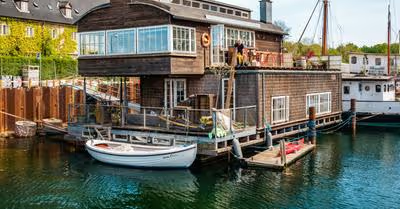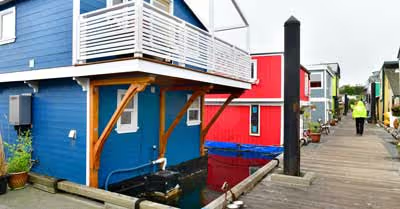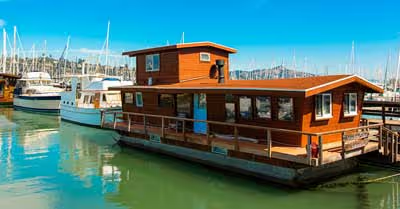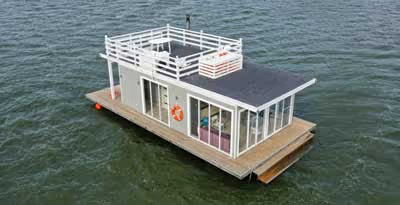
Key Takeaways
- Living on a houseboat combines home comforts with the joys of water-based living.
- Transitioning to a houseboat involves downsizing and learning new maintenance skills.
- Houseboat living offers potential cost savings and eco-friendly living options.
Discover the unique and fulfilling lifestyle of living on a houseboat as we explore expert tips on how to live on a houseboat.
To live on a houseboat, understand marina regulations, consider efficient utility management, and maximize space. Living on a houseboat also involves securing appropriate insurance, fostering a sense of community, and prioritizing safety, including weather preparedness and safety measures.
I’ve spent years studying the intricacies of houseboat living, from understanding marina regulations to mastering utility management and space optimization. My in-depth understanding of this lifestyle's unique challenges and joys ensures that I can provide valuable insights and guidance to those considering the houseboat way of life. So, let’s explore tips on how to live on a houseboat.
Table of contents
Hide Show- How To Live On a Houseboat
- Get Familiar With Marina Regulations
- Plan for Utilities and Maintenance
- Organize Your Space Efficiently
- Secure Insurance
- Embrace the Liveaboard Community
- Stay Safe - Weather and Safety Tips
- Houseboat Costs
- Can You Live on a Houseboat Full-Time?
- Green Living Afloat: Eco-Friendly Practices for Houseboat Living
- Frequently Asked Questions
- What are the top spots to anchor down as a houseboat dweller?
- What typical challenges should I expect with houseboat living?
- What should I look for when renting a houseboat to live on?
How To Live On a Houseboat
Living on a houseboat is not just an address change. It's a complete lifestyle transformation. Imagine waking up to the sound of water lapping against the hull of your home and enjoying sunsets that are never the same two evenings in a row.
But how does one actually live on a houseboat? It's about embracing the quaint living spaces, becoming a part of a close-knit marina community, and adapting to the unique challenges of waterborne life.
From managing utilities to planning the layout of your compact living space, every detail matters when you call the water your home.
Let's dive into what you need to know to set sail on your houseboat living adventure.
Get Familiar With Marina Regulations
Every marina you choose to moor your houseboat in will have its distinct regulations akin to a neighborhood association's rules. It's essential to acquaint yourself with these rules to ensure a harmonious stay.
These regulations can encompass various aspects, such as noise restrictions and pet policies. Additionally, you should be prepared for potential expenses associated with marina living, including docking fees, ranging from a few hundred to a thousand dollars per month.
Some marinas may limit how long you can remain stationed, so it's crucial to be aware of their stay limits.
Furthermore, it's beneficial to explore the amenities the marina offers, such as on-site shops, showers, or even a gym, and determine what is included in your fees and what comes at an extra cost.
Plan for Utilities and Maintenance
While your houseboat may offer a unique and idyllic living arrangement, it comes with practical responsibilities. Electricity on a houseboat is typically supplied similarly to a campground, either through a connection to the marina's power source or generated by your onboard generator.
You'll need to manage and budget for the associated costs. Additionally, water and sewage management are essential aspects of houseboat living.
Your vessel will have onboard tanks that require regular emptying for sewage disposal and topping up for freshwater supply.
Maintenance is an ongoing commitment to ensure the seaworthiness and longevity of your houseboat. This includes tasks such as rust prevention and bilge pumping to keep your home afloat and in good condition.
Organize Your Space Efficiently
Living on the water means economizing your space. Every square inch counts:
- Think vertical storage and multi-functional furniture.
- Clever compartments can hide away your water sports gear or fishing rods.
- Bonus if it serves as a seat or a bed!
Secure Insurance
Insurance isn't just for land lubbers—it’s also a must on the water.
- Coverage should protect against weather damage, theft, and personal liability.
- Shop around. Costs vary based on boat size and value, like a house or a car.
Embrace the Liveaboard Community
Houseboat living offers a unique opportunity to be part of a close-knit liveaboard community. Your neighbors are essentially a dock away, fostering strong camaraderie among residents.
Engaging in community activities is enjoyable and helps build lasting relationships. Participate in potlucks and dock parties, which are the houseboat equivalent of traditional block parties.
Sharing tips, tools, and occasional favors, such as borrowing a cup of sugar, is common practice among marina residents. Embracing the liveaboard community enhances your overall experience and makes houseboat living all the more enriching.
Stay Safe - Weather and Safety Tips
Safety is paramount when living on the water, and being prepared for various scenarios is essential. Stay informed about weather forecasts, as storms on the water can pose unique challenges.
Life jackets and well-defined evacuation plans are non-negotiable safety measures. These precautions ensure that you and your houseboat are well-prepared to handle emergencies and unforeseen weather events.
Houseboat Costs
If you're imagining your life gently rocking on the waves while being the proud owner of a houseboat, you've probably pondered over the costs associated with this unique lifestyle.
Living on a houseboat is about more than just the upfront costs. It's a lifestyle choice that involves ongoing expenses that can differ from those of a traditional home.
These expenses include the following:
Expect to budget monthly costs between $1,000 to $3,000, excluding your boat loan payments. This range will cover docking, utilities, maintenance, and insurance.
Can You Live on a Houseboat Full-Time?
Living on a houseboat full-time isn't just a dream; it's a reality for many. You can transform a houseboat into a cozy, full-time abode with the right mindset and adaptations.
It comes with its set of responsibilities, though, like maintenance and space management, but many find the trade-off well worth it for the unique experience and potential savings.
Here's a quick breakdown to get you started on what to expect:
- Space: Embrace minimalism because living on a houseboat means downsizing your living space.
- Maintenance: Get ready to roll up your sleeves; a houseboat requires regular upkeep to stay afloat.
- Legality: Most states allow it, but check local laws for specifics about marina residencies, property taxes, and other applicable zoning laws.
- Costs: It may be cheaper than traditional homes, with potentially lower initial purchases and monthly expenses. Just be prepared for marina or docking fees.
Green Living Afloat: Eco-Friendly Practices for Houseboat Living
Living on a houseboat is about embracing sustainability in a compact space. It's a lifestyle choice that's inherently more aligned with nature - think smaller living quarters, fewer belongings, and a closer relationship with the surrounding environment.
Below is a snapshot of green living afloat:
- Sustainable Energy: Leverage solar panels to harness the sun's power, reducing reliance on conventional electricity sources. Wind turbines can complement energy needs, especially in windy areas.
- Water Conservation: Implementing low-flow fixtures, such as faucets and showers, reduces water usage without sacrificing convenience. Rainwater harvesting systems enable the collection and reuse of rainwater for non-drinking purposes, ensuring a sustainable supply and conserving precious freshwater resources.
- Waste Management: Composting toilets offer a green alternative to traditional sewage systems, converting waste into valuable compost for use in gardens or landscaping. Proper trash sorting practices, including the separation of recyclables and compostables from landfill waste, reduce the volume of waste destined for landfills.
Frequently Asked Questions
Here are the FAQs on how to live on a houseboat.
What are the top spots to anchor down as a houseboat dweller?
Look for marinas or areas with the right amenities, community, and beauty. Waterfront locales vary widely in what they offer—some provide full-service marinas with electricity and water hookups, while others might mesmerize you with their natural splendor.
What typical challenges should I expect with houseboat living?
Like any unique way of life, houseboat living has its hurdles to hop over. Space is one—saying goodbye to expansive living areas and saying hello to compact efficiency is key.
Also, remember that your floating home requires regular maintenance to keep its shipshape, and dealing with waste removal is a necessity—either via daily or weekly scheduled services.
What should I look for when renting a houseboat to live on?
Consider the ownership structure—is it a timeshare model, traditional rental, or hire-boat ownership? Each has its perks and pitfalls. Scrutinize the boat's condition, available amenities, and the rental agreement's fine print.










